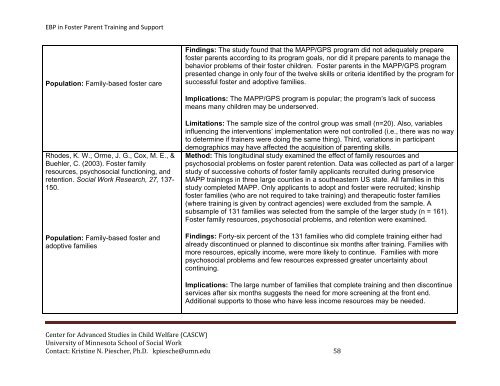Evidence-Based Practice in Foster Parent Training and Support ...
Evidence-Based Practice in Foster Parent Training and Support ...
Evidence-Based Practice in Foster Parent Training and Support ...
Create successful ePaper yourself
Turn your PDF publications into a flip-book with our unique Google optimized e-Paper software.
EBP <strong>in</strong> <strong>Foster</strong> <strong>Parent</strong> Tra<strong>in</strong><strong>in</strong>g <strong>and</strong> <strong>Support</strong>Population: Family-based foster careF<strong>in</strong>d<strong>in</strong>gs: The study found that the MAPP/GPS program did not adequately preparefoster parents accord<strong>in</strong>g to its program goals, nor did it prepare parents to manage thebehavior problems of their foster children. <strong>Foster</strong> parents <strong>in</strong> the MAPP/GPS programpresented change <strong>in</strong> only four of the twelve skills or criteria identified by the program forsuccessful foster <strong>and</strong> adoptive families.Implications: The MAPP/GPS program is popular; the program’s lack of successmeans many children may be underserved.Rhodes, K. W., Orme, J. G., Cox, M. E., &Buehler, C. (2003). <strong>Foster</strong> familyresources, psychosocial function<strong>in</strong>g, <strong>and</strong>retention. Social Work Research, 27, 137-150.Population: Family-based foster <strong>and</strong>adoptive familiesLimitations: The sample size of the control group was small (n=20). Also, variables<strong>in</strong>fluenc<strong>in</strong>g the <strong>in</strong>terventions’ implementation were not controlled (i.e., there was no wayto determ<strong>in</strong>e if tra<strong>in</strong>ers were do<strong>in</strong>g the same th<strong>in</strong>g). Third, variations <strong>in</strong> participantdemographics may have affected the acquisition of parent<strong>in</strong>g skills.Method: This longitud<strong>in</strong>al study exam<strong>in</strong>ed the effect of family resources <strong>and</strong>psychosocial problems on foster parent retention. Data was collected as part of a largerstudy of successive cohorts of foster family applicants recruited dur<strong>in</strong>g preserviceMAPP tra<strong>in</strong><strong>in</strong>gs <strong>in</strong> three large counties <strong>in</strong> a southeastern US state. All families <strong>in</strong> thisstudy completed MAPP. Only applicants to adopt <strong>and</strong> foster were recruited; k<strong>in</strong>shipfoster families (who are not required to take tra<strong>in</strong><strong>in</strong>g) <strong>and</strong> therapeutic foster families(where tra<strong>in</strong><strong>in</strong>g is given by contract agencies) were excluded from the sample. Asubsample of 131 families was selected from the sample of the larger study (n = 161).<strong>Foster</strong> family resources, psychosocial problems, <strong>and</strong> retention were exam<strong>in</strong>ed.F<strong>in</strong>d<strong>in</strong>gs: Forty-six percent of the 131 families who did complete tra<strong>in</strong><strong>in</strong>g either hadalready discont<strong>in</strong>ued or planned to discont<strong>in</strong>ue six months after tra<strong>in</strong><strong>in</strong>g. Families withmore resources, epically <strong>in</strong>come, were more likely to cont<strong>in</strong>ue. Families with morepsychosocial problems <strong>and</strong> few resources expressed greater uncerta<strong>in</strong>ty aboutcont<strong>in</strong>u<strong>in</strong>g.Implications: The large number of families that complete tra<strong>in</strong><strong>in</strong>g <strong>and</strong> then discont<strong>in</strong>ueservices after six months suggests the need for more screen<strong>in</strong>g at the front end.Additional supports to those who have less <strong>in</strong>come resources may be needed.Center for Advanced Studies <strong>in</strong> Child Welfare (CASCW)University of M<strong>in</strong>nesota School of Social WorkContact: Krist<strong>in</strong>e N. Piescher, Ph.D. kpiesche@umn.edu 58
















